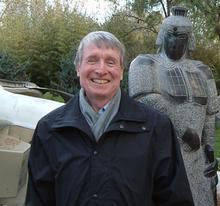John Henry Holland
| John Henry Holland | |
|---|---|
 |
|
| Born |
February 2, 1929 Fort Wayne, Indiana |
| Died | August 9, 2015 (aged 86) Ann Arbor, Michigan |
| Fields | Complex systems Psychology Electrical engineering Computer science |
| Institutions |
University of Michigan Santa Fe Institute |
| Alma mater | University of Michigan |
| Doctoral advisor | Arthur Walter Burks |
| Doctoral students | Melanie Mitchell |
| Known for | Research on genetic algorithms |
| Notable awards |
MacArthur Fellow (1992) Harold Pender Award (1999) Fellow of the World Economic Forum |
John Henry Holland (February 2, 1929 – August 9, 2015) was an American scientist and Professor of psychology and Professor of electrical engineering and computer science at the University of Michigan, Ann Arbor. He was a pioneer in what became known as genetic algorithms.
Holland was born in Fort Wayne, Indiana, in 1929. He studied physics at the Massachusetts Institute of Technology and received a B.S. degree in 1950, then studied Mathematics at the University of Michigan, receiving an M.A. in 1954. In 1959 he received the first computer science Ph.D. from the University of Michigan. He was a Professor of psychology and Professor of electrical engineering and computer science at the University of Michigan, Ann Arbor.
Holland was a member of the Board of Trustees and Science Board of the Santa Fe Institute. He was a fellow of the World Economic Forum.
Holland received the 1961 Louis E. Levy Medal from The Franklin Institute, and the MacArthur Fellowship in 1992.
Holland died on August 9, 2015 in Ann Arbor, Michigan.
Holland frequently lectured around the world on his own research, and on research and open questions in complex adaptive systems (CAS) studies. In 1975 he wrote the ground-breaking book on genetic algorithms, "Adaptation in Natural and Artificial Systems". He also developed Holland's schema theorem.
...
Wikipedia
